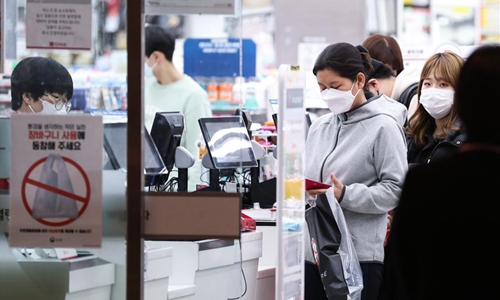HOME >> CHINA,SPECIAL-COVERAGE
Qingdao on high alert as infections in South Korea grow tenfold in a week
By Liu Caiyu Source:Global Times Published: 2020/2/25 12:41:26

Local residents wait to pay at the counter in a shop in Seoul, South Korea, Feb. 24, 2020. South Korea confirmed 231 more cases of the COVID-19 on Monday, raising the total number of infections to 833, and the death toll rose to eight. The country raised its four-tier virus alert to the highest "red" level on Sunday as the virus infections soared for the past week. (Xinhua/Wang Jingqiang)
The East Chinese city of Qingdao, a highly popular destination for South Koreans, is adopting a stricter epidemic prevention policy, asking all foreign visitors to either undergo a 14-day home quarantine or stay in designated hotels, as infection numbers in South Korea soared tenfold in less than a week.
Qingdao of Shandong Province began on Monday to arrange for designated vehicles to pick up all foreign visitors arriving in Qingdao and send them to their homes for a 14-day mandatory quarantine. Foreigners coming for short-term visits or business travel will be sent to designated hotels, Qingdao government announced.
Qingdao is a popular destination for South Koreans. Previous media reports said some 100,000 South Koreans reside in the city.
As of Tuesday morning, South Korea had 893 total infections, with eight deaths, ac-cording to the country's health ministry. South Korea's infections grew by 10 fold in less than a week, raising grave concerns worldwide.
According to Qingdao government, four categories of people will be quarantined and put under observation if they reach Qingdao: those with history of travel or resi-dence in an epidemic area with symptoms of fever or respiratory problems; those have had contact with new coronavirus infection cases; those who have shared the same means of transportation with confirmed cases and those who are found to have fever or respiratory problems during on-site inspection.
From January 24 to Sunday, airports in Qingdao received more than 20,000 overseas passengers, government data showed.
On Monday, netizens allegedly from Qingdao wrote on social media platforms that some South Koreans arrived at Qingdao were not placed under home quarantine like the Chinese citizens do, leaving a potential loophole in epidemic control.
Some speculated that South Koreans may be flying to Qingdao to avoid the rapid infection rise in their home country.
The South Korean embassy in Beijing dismissed such speculation. "It is not accurate to say that South Koreans came to China to avoid the outbreak. There are a lot of normal travelers coming and going between China and South Korea. The two countries are making efforts to combat the outbreak and prevent it from spreading," the South Korean embassy in Beijing told the Global Times Tuesday.
The Global Times found the price of flight tickets from Seoul to Qingdao had soared to 4,000 yuan ($568.9)on Wednesday on a flight ticket platform, while the price is normally between 400 yuan and 700 yuan.
Qingdao government said it will take the initiative to communicate with foreigners in Qingdao and offer services accordingly, resolutely preventing the spread of the epidemic from other countries.
No new confirmed cases in Qingdao were reported as of Tuesday morning. The total number of coronavirus infection cases is 60, of whom 38 were discharged from hospitals after recovery.
Hunchun, a North Korean border city in Northeast China's Jilin province, also imposed a 14-day mandatory quarantine for all foreign returnees to the city amid the COVID19 outbreak. Those without permanent residence will be sent to designated places for quarantine.
From Sunday night, the airport in Yanji, Northeast China's Jilin Province, strengthened its precautionary measures on inspection of flights from South Korea. Flights from South Korea will go through designated channels and will be isolated from domestic flights.
Posted in: SOCIETY